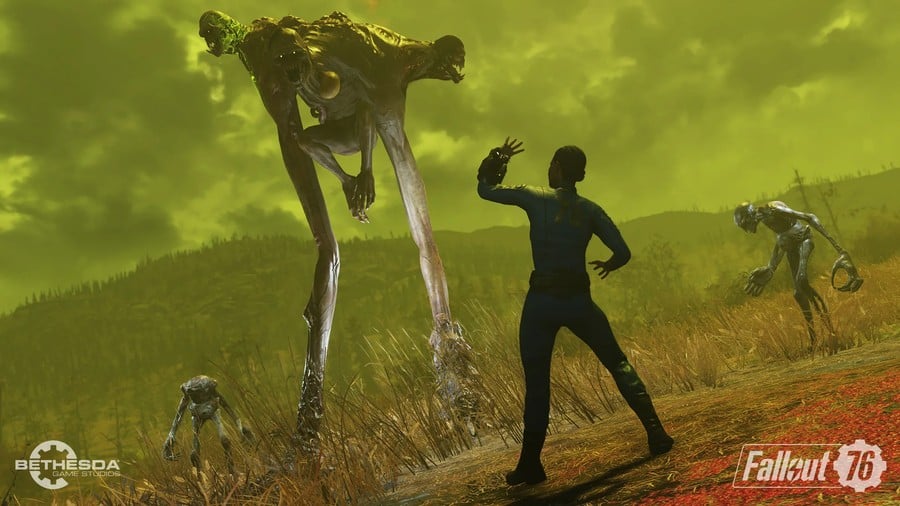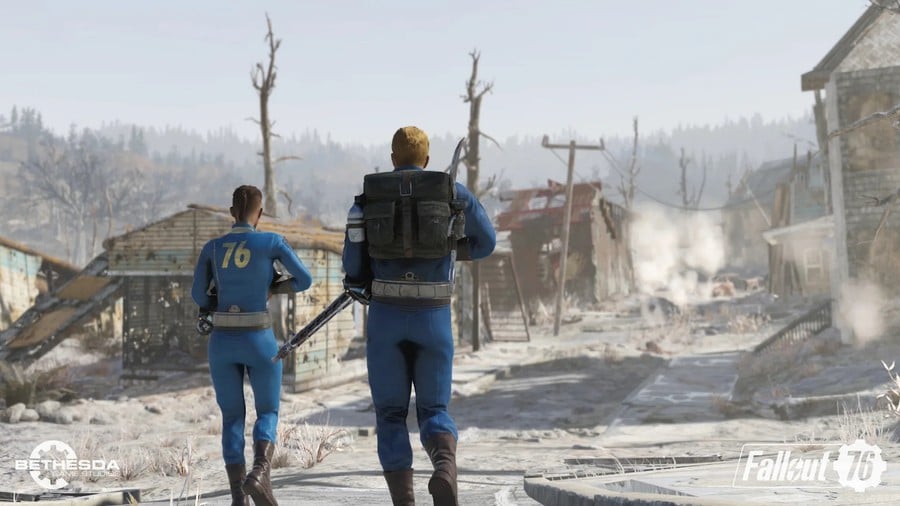
Bethesda's pseudo-MMO, always-online world Fallout 76 has had, to put it mildly, a rough time of things. Releasing to catastrophically poor reviews, the game slowly worked its way back to something more closely resembling mediocrity. However, underneath all that was the bedrock of Fallout's amazing-as-ever music, courtesy of Inon Zur, and we recently had the chance to chat with him about his work on helping to sonically transform Appalachia alongside the Wastelanders update. We talk about how Wastelanders was basically like scoring an entirely new game, and how birds might have impacted the sound of the new update. Read on!
Push Square: How strange was the scoring experience for Wastelanders? It’s technically a game you already wrote the score for, so how did you approach the music? Since the expansion fundamentally changes the way the game works, did you take a similar approach with the music?
Inon Zur: The musical changes from the core 76 game to its DLC are not radical, but specifically as to the Wastelanders DLC, we intentionally let the general approach for 76’s score evolve organically. For example, some of the motifs that I wrote for Fallout 76 were developed into a more melodically complete and song-like form. The structure of the cues was also developed and grew organically. Also, if any of the cues in 76 were leaning towards a song-like structure, in Wastelanders we developed this further with defined melody, rhythm, and harmonical structure.
Appalachia is a wildly different place in some regions of the map now. In what ways did you want to help address that musically? What changed in those areas sonically?
The choice of the instruments definitely changed. I adopted more of a classical approach and brought more traditional instruments to the score. I also re-harmonized some of the original cues that were written for 76 – in order to fit not only the Appalachian surroundings, but also to enhance the new story.
What is it about the Fallout universe that keeps you coming back to it again and again? You’ve scored all of the Bethesda published titles in the series, with no signs of slowing down! And all the scores are incredible! What’s the secret?
Thank you! The Fallout world is so vast and majestic to me. It offers so many unique opportunities to come up with original material and sounds, which I love doing so much. The fact that this world is created in an alternative reality allows me the opportunity to take known elements but use them in a new and non-traditional way. I can let my imagination run wild, almost anything is possible… experimenting with instruments (and combinations of) can be developed to support this altered reality. This always ignites my creativity.

How much work went into the new music? Crafting a score for a game isn’t exactly an easy thing to do. How did the time spent on Wastelanders compare to the base experience of Fallout 76? To other scores in the series?
We spent about a year on the score for Wastelanders, which is huge for a DLC. We knew we wanted to create an original soundtrack and worked really hard on crafting something new to reflect Wastelanders’ story, experimenting with many different ideas during the process. It almost felt like scoring a brand new game, which was very interesting to me.
What influences did you look to when scoring the expansion? Did you stay within the wheelhouse of the series itself? Did you look to things that might be unexpected sources of inspiration?
I always look for 3 main influences/inspiration elements: 1.) What we did before on the game and how it can be adopted and developed. 2.) Other new musical influences which, for example, could be an ethnic musical element that we feel fit the setting, or even classical music that inspires me and gives me some new perspectives. 3.) Finally – just listening to the outside environment – birds, cars, the wind, they all evoke some sort of music that can be modified to be part of a score. Put these 3 sources together and you have my approach to forming a new composition.
Are there any ideas you had for the base version of 76 (or even further back to your other Fallout scores perhaps) that you had to leave out, but were then able to implement in the Wastelanders expansion? A theme? A type of instrument?
One of the things that I did not do during the creation of the main score for 76 but got to do for Wastelanders is actually revisiting some ideas from previous games like Fallout 4 and Fallout: New Vegas. I think it worked very nicely for Wastelanders, and I was very happy to revisit them and give them a new lease of life – of course with a fresh treatment that fits the setting of the new game.
Last, but not least: to close out all my first-time interviews, I like to ask how you got into the industry? What brought you to gaming? Was it a conscious effort to find your way over there, or did it just sort of happen?
I was previously working in film and television when an agent by the name of Bob Rice approached me about scoring games. Initially I said no thank you, as I was not aware of the creative opportunities and budgets available in games for recording orchestras. Fortunately, he was persistent and the rest, as they say, is history.
And there we have it, some discussion about Fallout 76 and how the sound was redesigned in some respects to adapt to the changing world in-game. The Fallout 76 score, as well as the Wastelanders score (some of the best aspects of the game, frankly) are both available to stream or purchase. Anyone interested in checking out the new music for the game can do so over on YouTube. Let us know down below what you think of Fallout 76's newest update, as well as its music!





Comments 8
Nice interview. I loved Inon's music in the first two Dragon Age games but I honestly wasn't aware he did the Fallout games too. Loved Fallout 4's original score.
@ApostateMage I spent so many hours listening to the radio in Fallout 4, but for a while I decided to turn it off because I realised I'd never really listened to the original score. I was blown away by how good it was.
@ShogunRok @ApostateMage Definitely in the same boat. I basically always have the radio station on when I'm in Fallout, but those moments when I turn it off to pick up a different signal and forget to turn it back on tended to make for some breathtaking musical moments!
one good thing from 76 is his music... rest is just mess.
The Prince of Persia 2008(my profile picture) Soundtrack by Inon Zur is still one of my favourites. It is so beautiful and relaxing. Music in videogames have evolved so much that it became the one thing for me that really connects me to specific games. Like Kuzes theme Oath of Enma in Yakuza 0; End theme of Dishonored, Honor for all; Song of the Ancients in both Nier and Automata; The Airbuster in Final Fantasy VII Remake and so on. Amazing themes, music pieces and songs that really amplify these experiences. Cheers and happy gaming to us all.
@RaZieLDaNtE Couldn't agree more! I think I have more distinct game memories tied to music than anything else in the medium! Innumerable amazing moments in games motivated by the music!
This interview confirmed what I thought I was hearing, that he reworked some of the New Vegas soundtrack for Wastelanders. I don't know if anything will ever top New Vegas, such a memorable score from Inon, but the 76 music is great. I kind of miss the launch soundtrack, it never got old to me. I wish Bethesda would let us choose between the two.
@charlesdjones1 That'd be a cool way to keep some of the old music that got shifted out around! Sneak it into a new radio station, although that wouldn't make a ton of sense either I suppose haha
Show Comments
Leave A Comment
Hold on there, you need to login to post a comment...